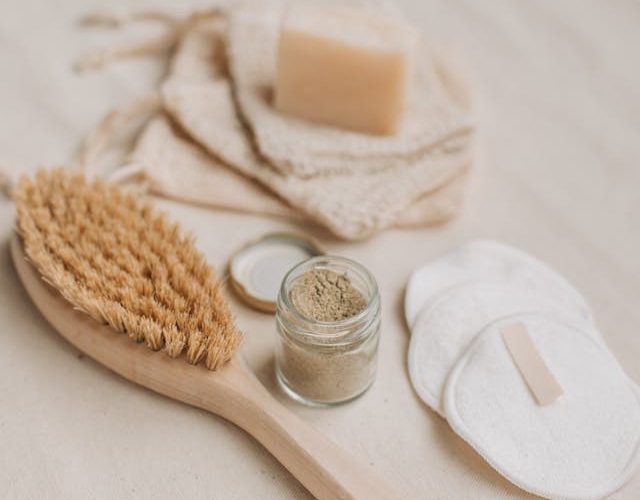Sustainable skincare refers to products and practices that are not harmful to the environment. This can include using natural, cruelty-free ingredients, eco-conscious packaging, and practices that minimize waste and carbon footprints. Sustainable skincare is also mindful of ethical sourcing and labor practices.

Understanding the Environmental Impact of Conventional Skincare
- Harmful Ingredients: Many conventional skincare products contain ingredients like microbeads, synthetic fragrances, parabens, and sulfates. These chemicals can be harmful to aquatic life when they wash down the drain and accumulate in water bodies. For example, microbeads are tiny plastic particles that are non-biodegradable and can persist in oceans, harming marine animals.
- Non-Recyclable Packaging: Conventional beauty products often come in excessive plastic packaging that is not recyclable or biodegradable. Plastic waste from beauty products contributes significantly to global pollution, filling landfills and polluting oceans.
- Carbon Footprint: Manufacturing and shipping products also leave a significant carbon footprint. The processes involved in sourcing ingredients, manufacturing the products, and distributing them globally require energy, often generated by fossil fuels. This leads to increased carbon emissions, contributing to climate change.
Principles of Building a Sustainable Skincare Routine
- Choose Eco-Friendly Ingredients: Look for products with natural, organic, and cruelty-free ingredients. Avoid synthetic chemicals and opt for plant-based alternatives. Common eco-friendly ingredients include aloe vera, chamomile, shea butter, and jojoba oil. These not only nourish the skin but are also better for the environment.
- Minimalist Approach: Adopting a minimalist skincare routine helps reduce consumption and waste. Focus on quality over quantity—use fewer products that serve multiple purposes. For instance, a good facial oil might serve as both a moisturizer and a serum.
- Eco-Conscious Packaging: Seek products that come in recyclable, biodegradable, or refillable packaging. Brands that use glass, metal, or paper packaging tend to be more environmentally friendly. Some companies also offer refillable products, helping you minimize packaging waste.
- Support Ethical Brands: Research brands to ensure they practice sustainability. Ethical brands focus on sustainable sourcing, fair labor practices, and transparency in their operations. Some brands even offset their carbon footprint by using renewable energy sources or participating in reforestation programs.
Key Sustainable Skincare Products to Incorporate
- Cleansers: Look for cleansers made with biodegradable formulas and natural ingredients. Gentle, plant-based cleansers like those made with aloe vera, chamomile, or green tea are effective and environmentally friendly. Avoid products with harsh sulfates or synthetic additives.
- Moisturizers: Opt for moisturizers with sustainably sourced natural oils like coconut oil, shea butter, or jojoba oil. These ingredients are nourishing for the skin and biodegradable. Look for products packaged in recyclable glass jars or tubes made from post-consumer recycled materials.
- Sunscreen: Reef-safe sunscreens are essential for both skin and environmental protection. Choose mineral sunscreens with non-nano zinc oxide or titanium dioxide, which are safe for marine life. Chemical sunscreens often contain oxybenzone and octinoxate, which have been shown to harm coral reefs.
- Exfoliants: Avoid exfoliants with microbeads, as they contribute to ocean plastic pollution. Instead, use natural exfoliants like sugar, salt, or ground coffee, which are biodegradable and gentle on the skin.
- Serums and Treatments: When choosing serums, opt for those with minimal ingredients and sustainable sourcing. For example, vitamin C or hyaluronic acid serums from brands that focus on ethical harvesting of their plant-based ingredients are better for both skin and environment.
- Oils for Lips: Lips require special care, and using natural oils like coconut oil, almond oil, or jojoba oil is a great sustainable option. These oils are not only deeply hydrating but are also derived from renewable resources. Look for lip oils packaged in glass containers, or even better, create your own lip balm using simple, eco-friendly ingredients like beeswax and essential oils.
DIY Sustainable Skincare Tips
- Homemade Masks and Exfoliants: DIY skincare is a fantastic way to reduce waste and control the quality of the ingredients you’re using. For example, an oatmeal and honey mask can be deeply hydrating, while a sugar and olive oil scrub works as a natural exfoliant. These ingredients are often already in your kitchen and are biodegradable.
- Upcycling Packaging: Repurpose empty skincare containers instead of throwing them away. Glass jars can be used to store small items like jewelry, or they can be repurposed for future homemade skincare recipes. Similarly, old bottles can be transformed into DIY planters or decor.
- Reducing Waste: Sustainable skincare also means reducing waste. Make sure to use up every drop of a product before purchasing new ones. Store products properly to prolong their shelf life. You can also try “naked” products, like solid shampoo bars, which come without packaging.
Evaluating Brands for Sustainability
- Transparency: Choose brands that are transparent about their ingredients, sourcing, and manufacturing processes. Brands that disclose detailed information about how they source their ingredients, where they manufacture their products, and how they handle waste are more likely to be genuinely sustainable.
- Certifications to Look For: Certifications are a helpful way to identify sustainable products. Some key certifications include:
- USDA Organic: Ensures that ingredients are organic and free from harmful pesticides.
- Fair Trade: Guarantees ethical sourcing and fair labor practices.
- Leaping Bunny: Certifies that the product is cruelty-free.
- EcoCert: Focuses on sustainability in both product ingredients and packaging.
- Greenwashing Awareness: Greenwashing is when brands falsely advertise their products as eco-friendly without actually implementing sustainable practices. Be cautious of vague labels like “natural” or “green” without proper certifications or transparency. Research the brand’s sustainability efforts to verify their claims.
Sustainable Skincare Habits Beyond Products
- Conscious Consumption: Sustainable skincare goes beyond the products themselves. Adopt a conscious consumption mindset by purchasing only what you truly need. Before buying a new product, evaluate whether it’s essential or if you can use up what you already have. This reduces both product waste and packaging waste.
- Water Conservation: Water is an essential part of most skincare routines, but it’s important to conserve it. Take shorter showers, turn off the tap while washing your face, and use leave-on treatments that don’t require rinsing. This reduces your water usage and minimizes your environmental impact.
- Energy Efficiency: Opt for reusable beauty tools, like cloth face pads instead of disposable cotton pads, or bamboo brushes instead of plastic ones. Energy-efficient beauty tools, like those that use less electricity or can be charged via solar energy, also help reduce your carbon footprint.
Final Thought
Sustainability in skincare isn’t just a trend—it’s a meaningful shift toward a more responsible and mindful way of caring for our skin and the planet. By adopting eco-friendly products, reducing waste, and supporting ethical brands, you can make a real difference in minimizing your environmental footprint. Every small change adds up, whether it’s choosing a product with sustainable packaging or creating your own DIY treatments. Remember, the goal isn’t perfection but progress. By making thoughtful decisions, you can nurture both your skin and the environment, ensuring that future generations inherit a healthier, more sustainable world.





















